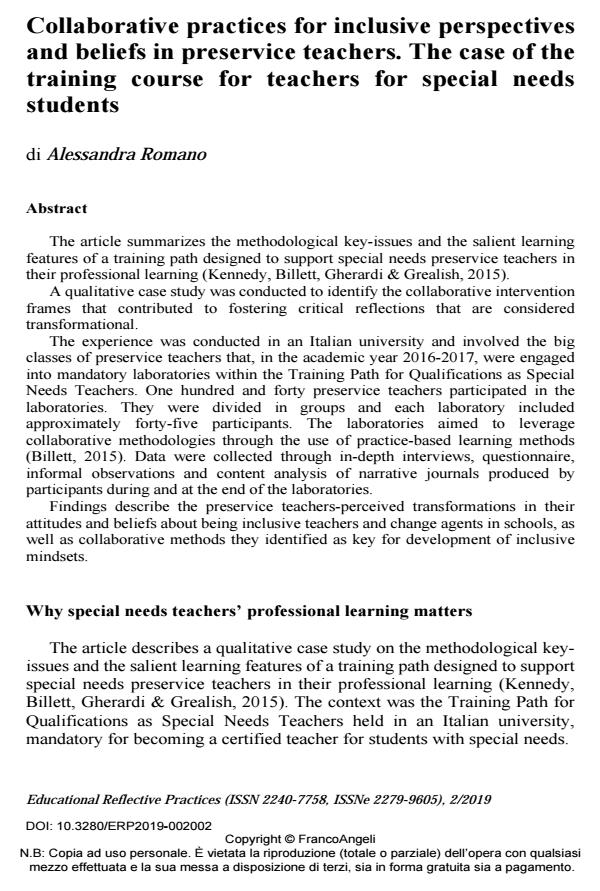Collaborative practices for inclusive perspectives and beliefs in preservice teachers. The case of the training course for teachers for special needs students
Titolo Rivista EDUCATIONAL REFLECTIVE PRACTICES
Autori/Curatori Alessandra Romano
Anno di pubblicazione 2020 Fascicolo 2019/2
Lingua Inglese Numero pagine 18 P. 19-36 Dimensione file 221 KB
DOI 10.3280/ERP2019-002002
Il DOI è il codice a barre della proprietà intellettuale: per saperne di più
clicca qui
Qui sotto puoi vedere in anteprima la prima pagina di questo articolo.
Se questo articolo ti interessa, lo puoi acquistare (e scaricare in formato pdf) seguendo le facili indicazioni per acquistare il download credit. Acquista Download Credits per scaricare questo Articolo in formato PDF

FrancoAngeli è membro della Publishers International Linking Association, Inc (PILA), associazione indipendente e non profit per facilitare (attraverso i servizi tecnologici implementati da CrossRef.org) l’accesso degli studiosi ai contenuti digitali nelle pubblicazioni professionali e scientifiche.
The article summarizes the methodological key-issues and the salient learning features of a training path designed to support special needs preservice teachers in their professional learning (Kennedy, Billett, Gherardi & Grealish, 2015). A qualitative case study was conducted to identify the collaborative intervention frames that contributed to fostering critical reflections that are considered transformational. The experience was conducted in an Italian university and involved the big classes of preservice teachers that, in the academic year 2016-2017, were engaged into mandatory laboratories within the Training Path for Qualifications as Special Needs Teachers. One hundred and forty preservice teachers participated in the laboratories. They were divided in groups and each laboratory included approximately forty-five participants. The laboratories aimed to leverage collaborative methodologies through the use of practice-based learning methods (Billett, 2015). Data were collected through in-depth interviews, questionnaire, informal observations and content analysis of narrative journals produced by participants during and at the end of the laboratories. Findings describe the preservice teachers-perceived transformations in their attitudes and beliefs about being inclusive teachers and change agents in schools, as well as collaborative methods they identified as key for development of inclusive mindsets.
Alessandra Romano, Collaborative practices for inclusive perspectives and beliefs in preservice teachers. The case of the training course for teachers for special needs students in "EDUCATIONAL REFLECTIVE PRACTICES" 2/2019, pp 19-36, DOI: 10.3280/ERP2019-002002